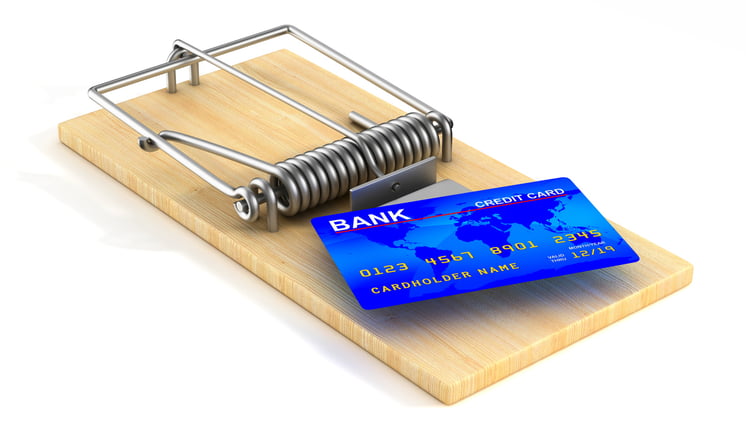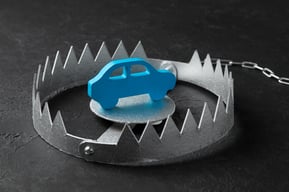
Recently, I saw a survey taken by CrediCards.com showing that large retailers offering new store credit cards have increased the interest rates on those cards substantially in the last few months. The article noted that this is particularly ironic as the Federal Reserve has lowered interest rates during this same period. This article demonstrates how merchants using CrossCheck services help consumers avoid debt traps.
This is what the survey found:
- The average APR on store-only credit cards has increased to 27.52%.
- The average APR for new co-branded store cards (that can be used at other stores) has risen to 23.39%.
- The average APR for all retail store cards is 26.01%.
Like other things in life, these store cards have a good side and a bad side. First, the good.
Consumers will get special offers and sometimes rebates or loyalty points. They also may save some money if they can use the card and pay it off in full every month.
Getting into Debt Traps
However, if they don’t pay it off, and instead “revolve” the debt, they could get caught in a debt trap. This is because these “deferred interest cards” will charge interest on everything consumers have bought during this  period at the rates quoted above, retroactive to day one when they bought the first item.
period at the rates quoted above, retroactive to day one when they bought the first item.
Let’s compare apples to apples.
Again, the research from CreditCards.com shows that the median APR for all credit cards is about 21.1%. This is five percentage points below store cards!
There is one particular furniture store credit card that charges a single APR of 30.24%.
Avoiding Debt Traps
Now it turns out that furniture stores are one of the key merchant categories served by CrossCheck.
Let’s explore this idea in more detail.
The website forrent.com estimates that the cost of furnishing the average apartment is $8,176, a not insubstantial sum, particularly for someone just starting out.
Another source, the website furnishr.com, estimates that furnishing a mid-range one-bedroom apartment could cost between $2,930 and $5,450. It is broken down as follows: $2,050 – 3,150 in the living room and $880 – $2,300 in the bedroom.
Now let’s calculate the interest cost if the consumer got caught in a debt trap.
Let’s say they spent half of the estimate by forrent.com, which would be $4,088, and the APR was 30.24%. Their annual interest-only expense would be $1,236 if they did not pay down the principal amount. Not to put too fine a point on it, but about every three years, they would pay nearly the same amount in interest as the original purchase price and still not reduce the principal.
The CrossCheck Solution to Avoiding Debt Traps
Now let’s look at how much better the consumer would be when they shop at a furniture store offering CrossCheck’s Multiple Check service.
CrossCheck invented this service many years ago, or to be more precise, our merchant customers in automotive retail encouraged us to invent it.
We had car dealers coming to us and saying, “We have a consumer who qualified for the bank loan, but the bank wants them to make a down payment. The consumer does not have the full amount of the down payment today, but they could come up with it if we gave them a little extra time. Then, they could drive out of here today with the car they want. Can you help us with this? We want to get the taillights over the curb!”
The CrossCheck product development team considered the options and came up with Multiple Check.
How Multiple Check Helps Avoid Debt Traps
The Kelly Blue Book website (kbb.com) suggests a 10 percent down payment on a new car, and perhaps a $1,500 down payment on a used car. The average new car today is $35,000, which translates to a down payment of about $3,500.
Using Multiple Check, the dealer asks the consumer if they could put $1,500 down today, and pay the balance of $2,000 with three checks over the next 30 days (sometimes longer). Most of the time, the consumer will be able to do this.
We let the consumer choose how much each check should be and their deposit dates.
Now, here are the key points to Multiple Check:
- We do not run a credit check on the consumer, ask them to apply for a loan, or charge them interest.
- The consumer does not pay anything extra to use Multiple Check.
- CrossCheck guarantees each check as they are deposited by the merchant.
This product has proven to be very successful with our merchant customers selling big-ticket items (e.g. autos, home furnishings, tires), and of course, very popular among consumers.
This is why many merchants offer the CrossCheck Multiple Check product. They want the consumer to have a good CX (consumer experience) and get the items that they want without having to settle for something cheaper. They want the consumer to come back again and again, and even refer their friends. They do not want the consumer to have to open a bill from a credit card company every month with a big balance and carry a grudge.
Download our free guide to learn how CrossCheck helps complete more merchant sales, and best of all, helps consumers avoid the debt trap!


